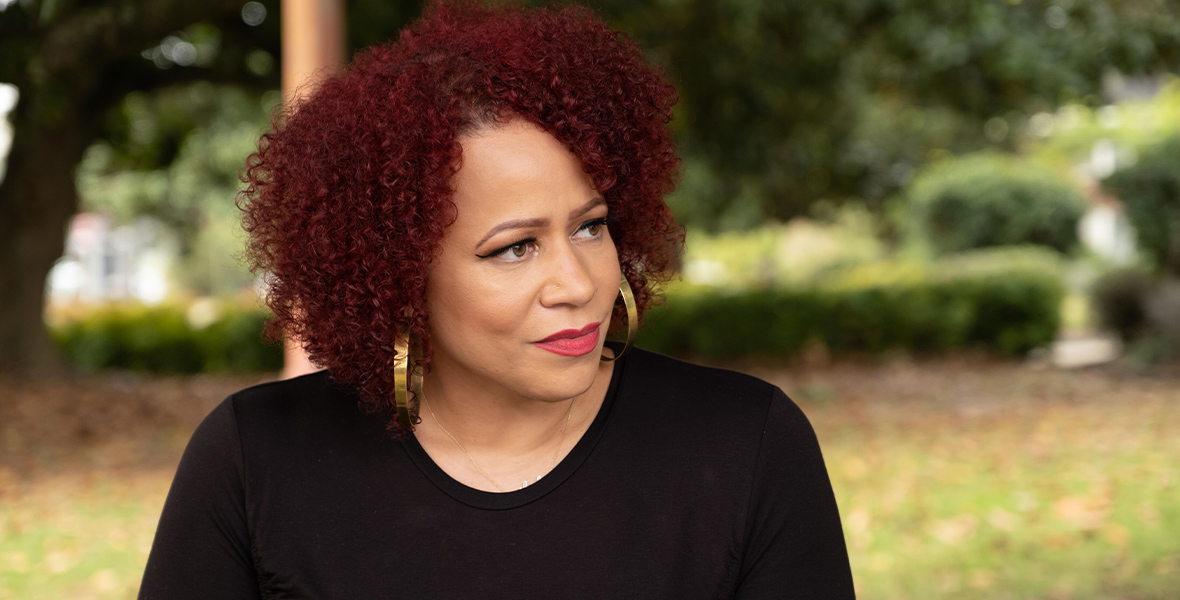By Zach Johnson
In 2019, to commemorate the 400th anniversary of the beginning of slavery in the United States, Pulitzer Prize-winning journalist Nikole Hannah-Jones launched The 1619 Project in the pages of The New York Times Magazine. The ongoing initiative aims to reframe the country’s history by placing the consequences of slavery and the contributions of Black Americans at the center of the national narrative. The 1619 Project since expanded into a limited docuseries, now streaming on Hulu.
“This is the story of America,” Hannah-Jones says. “That’s our argument: You can’t understand the story of America without understanding the story of slavery and Black Americans. It’s really important, when we set the tone for what this documentary series is, that it’s not a documentary series about Black people. It’s a documentary series about America. All of us Americans should come away with a better understanding of the country we live in.”
Hosted by Hannah-Jones, the docuseries has been in the works for several years. “We went with Disney, Onyx Collective, and Hulu for a number of reasons,” Hannah-Jones says, noting that CEO Bob Iger “had a strong belief in the project, so we were going to get the resources that we needed to produce the work that we wanted to produce.”
Each week through Thursday, February 9, a pair of episodes—”Democracy” and “Race,” “Music” and “Capitalism,” and “Fear” and “Justice”—will debut exclusively on Hulu. Adapted from essays in the recently published book, The 1619 Project: A New Origin Story, each episode will examine how the legacy of slavery shapes different aspects of contemporary American life. “One of the first things Nikole said to me was that this project is going to be ‘unflinching,’” executive producer and director Rogers Ross Williams says. “We really held to that [notion]. That was always in our head—that we were going to be ‘unflinching.’ We were not going to water down this project in any way. It was going to tell the complete truth, whether it’s uncomfortable or not.”
According to Williams, who directed the first and last episodes, unpacking The 1619 Project was revelatory. “Growing up, I didn’t really know the story of America. I was taught something totally different,” he admits. “When I first read The 1619 Project, it was like my brain exploded. It was an incredible, eye-opening experience, and I hope that everyone [who watches this] has the experience I did when I first experienced it.”
Similar to Williams, executive producer and showrunner Shoshana Guy says that she felt “so seen” listening to Hannah-Jones’ The 1619 Project podcast and reading her work in The New York Times Magazine. In fact, when Guy was approached about showrunning the docuseries, she recalls, “I was like, ‘This is mine. I’m meant to do this.’”
As it turns out, Guy and Hannah-Jones share a surprising connection. “Nikole and I are connected through Waterloo, Iowa, which is kind of strange, in a way, because it’s a small community,” Guy shares. “My great-grandparents are buried there. My father was born there. My grandmother was born there. It just felt ancestral in nature that I was connected to her and to the place that she was from.” Hannah-Jones adds, “It may not need to be said, but it’s not often that you meet other Black people who have roots in Waterloo, Iowa! We definitely felt like it was an inspired moment.”
Turning The 1619 Project into a Hulu Original with Guy and Williams “has been the most amazing experience,” Hannah-Jones continues. “It’s a frightening thing to take your work and put it in the hands of people who know a medium that you don’t know and that you haven’t worked in before. But the trust and the respect we had on this team is something I will never forget.” Ultimately, Hannah-Jones says, “It was a powerful experience to try to tell these stories in a different way—and a challenging one.”


